Why we hate power companies
Consumer representative group Choice has released a survey finding Australians' biggest fear are electricity bills. The results are illustrated below.
Why on earth are we so worried about electricity? It’s actually a fair question to ask, when you consider how small a portion power bills are of our expenditure.

Source: Essential Research on behalf of Choice, Brotherhood of St. Laurence and the Energy Efficiency Council
According to the last Bureau of Statistics household expenditure survey, on average we spend more on alcoholic beverages than electricity. Back when the survey was done (2009-10) electricity took up the grand sum of $24.23 per week, this is about the same as households spent on confectionary, condiments and TV dinners. Heck, we’re more worried about electricity bills than that other consumer hot button, petrol, which we spend around $50 per week on.
Meanwhile, Choice finds we aren’t anywhere near as worried about mortgage or rent, but households spent $160 per week on these items.
After hearing about this survey result I did a quick straw poll around the office – how much electricity did you consume in your last bill? No one could recall.
OK, how much was your last electricity bill? Again few answers.
Why so much worry about an expenditure item we barely seem able to recall?
Well, that is probably where the problem lies. With most other items we buy we make a conscious decision before we purchase about how much money we’ll hand over. At the petrol bowser we can choose as we pull up whether we can afford to $20 on fuel or to fill the whole tank. While paying rent is a big budget item, we know what we’re up for each week for a year in advance when we sign the lease. With supermarket shopping, if things are a bit tight one week we can elect to go without the confectionary, condiments and TV dinners.
But when it comes to electricity we lose this ability to make conscious decisions about expenditure before we make the purchase. Instead we’re flicking switches on and off throughout the day with little understanding of how much it’s costing us. Then, two or three months later, we get a bill and we still don’t really know what might have caused this bill to be substantially higher than the last. What’s more we really can’t afford to not pay the electricity bill – disconnection makes life impossible.
It doesn’t help that electricity companies like Energy Australia sign up customers to two-year contracts with the lure of discounts and then, later, hike up electricity prices without notifying the customer beforehand. One has to ask, why on earth is there a need to lock customers into two-year contracts when:
1) the electricity business doesn’t hand over any expensive equipment for free (for example a mobile phone); and
2) the power company is free at any time to change the most important component of the contract – the price.
In mobile telephony we may have to sign a two-year contract but in return we get a new shiny mobile phone that would otherwise cost a few hundred dollars. Plus we get to fix our monthly spend and call allowance over that contract period. Also, if we’re about to go over our monthly call and internet allowance, the telecommunications company sends us a message warning us.
You don’t get that with your power company.
Given all this one can perhaps understand how angry households got after the 100 per cent hike in power prices that occurred between 2007 and 2012.
So what to do?
Well, many of the power companies and their regulators seem to think that we should cut renewable energy and energy efficiency support schemes, which might shave a tiny fraction off the bill. But then again, economic energy market modelling suggests it’s just as likely to mean power companies get higher returns for their fossil fuel generators.
Consumers don’t seem too keen on that idea. The Choice survey asked respondents what measures they think state governments should employ to help reduce energy bills, with the results illustrated below. The most popular measure was helping households and businesses consume less energy. Something, for example, which state governments are doing through the Victorian and NSW energy efficiency tradeable certificate target schemes. The least popular by a country mile was reducing incentives for renewable energy.

Source: Essential Research on behalf of Choice, Brotherhood of St. Laurence and the Energy Efficiency Council
Households are worried about their power bills because they lack understanding and control over them and the reality is that, for the most part, they’re too busy to build that understanding.
They don’t want to have to watch their meter every few hours and run around the house switching things on and off. What they want is for others to provide the 'set and forget' equipment that will bring their bills under control without them having to think too hard.
And that’s why solar has been so popular.
It’s also why making energy efficient equipment the affordable default is something households support.
















